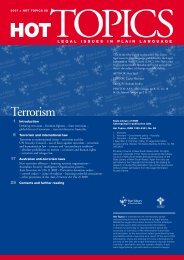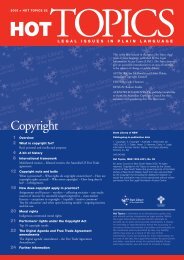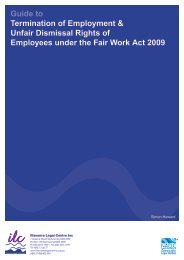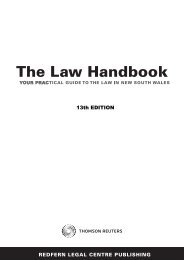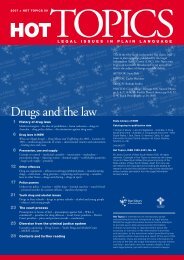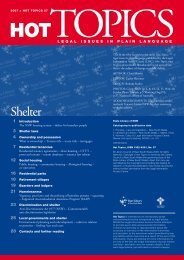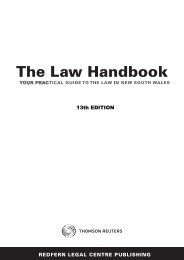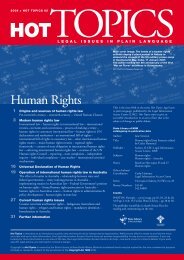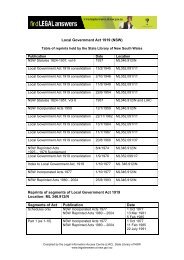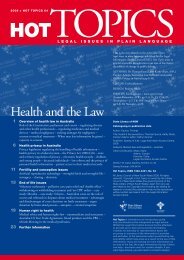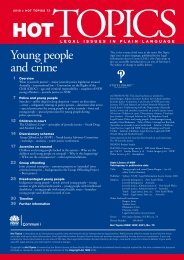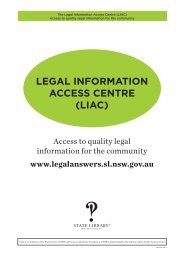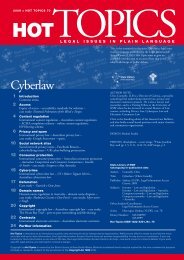Aboriginal people and the law - Legal Information Access Centre
Aboriginal people and the law - Legal Information Access Centre
Aboriginal people and the law - Legal Information Access Centre
Create successful ePaper yourself
Turn your PDF publications into a flip-book with our unique Google optimized e-Paper software.
2 <strong>Aboriginal</strong> <strong>people</strong> <strong>and</strong> <strong>the</strong> <strong>law</strong> 43Since 1996, <strong>the</strong>re have been attempts tosubstantially weaken <strong>the</strong> first four of <strong>the</strong>seActs. Notably, <strong>the</strong> federal government abolished<strong>the</strong> <strong>Aboriginal</strong> <strong>and</strong> Torres Strait Isl<strong>and</strong>erCommission in 2005 <strong>and</strong> repealed <strong>the</strong><strong>Aboriginal</strong> <strong>and</strong> Torres Strait Isl<strong>and</strong>er CommissionAct 1989. The amendments to <strong>the</strong> NativeTitle Act have drawn criticism both inAustralia <strong>and</strong> internationally, as has <strong>the</strong>Nor<strong>the</strong>rn Territory National Emergency ResponseAct 2007, under which <strong>the</strong> Commonwealthcompulsorily acquired leases of <strong>Aboriginal</strong>l<strong>and</strong> in <strong>the</strong> Nor<strong>the</strong>rn Territory tosupport tough regulation of <strong>Aboriginal</strong>communities, including alcohol bans <strong>and</strong>welfare spending restrictions.The Hindmarsh Bridge caseIn <strong>the</strong> Hindmarsh Bridge case (Kartinyeri v Commonwealth(1998) 72 ALJR 722), <strong>the</strong> High Court consideredwhe<strong>the</strong>r s 51(xxvi) of <strong>the</strong> Constitution could be used to<strong>the</strong> detriment of <strong>Aboriginal</strong> <strong>people</strong>. The court wasdivided on <strong>the</strong> question, but <strong>the</strong> majority held that <strong>the</strong>Hindmarsh Isl<strong>and</strong> Bridge Act 1997 (Cth), which placeditself outside <strong>the</strong> provisions of <strong>the</strong> <strong>Aboriginal</strong> <strong>and</strong> TorresStrait Isl<strong>and</strong>er Heritage Protection Act 1984 (Cth), wasvalid on <strong>the</strong> general principle that <strong>the</strong> power to make anAct must include <strong>the</strong> power to repeal or amend it.Justice Kirby argued that a greater principle shouldapply, <strong>and</strong> Justice Gaudron noted that “it is difficult toconceive of a present circumstance pertaining to <strong>Aboriginal</strong>Australians which could support a <strong>law</strong> operatingto <strong>the</strong>ir disadvantage”. Never<strong>the</strong>less, <strong>the</strong> constitutionalityof <strong>the</strong> 1997 Act was upheld without recourse tointerpretation of s 51(xxvi).Wurridjal v The Commonwealth [2009] HCA 2;(2009) 237 CLR 309On 25 October 2007 Mr Wurridjal commenced High Courtaction alleging that <strong>the</strong> Nor<strong>the</strong>rn Territory NationalEmergency Response Act 2007 <strong>and</strong> o<strong>the</strong>r Acts thatsupported it were invalid because <strong>the</strong>y amounted to anacquisition of property without just terms compensation,contrary to s 51(xxxi) of <strong>the</strong> Constitution. He claimedthat although <strong>the</strong> Commonwealth had given compensationfor <strong>the</strong> acquisition of leases over <strong>Aboriginal</strong> l<strong>and</strong>,<strong>the</strong> traditional owners had also been deprived of <strong>the</strong>irrights to access <strong>the</strong>ir traditional country because <strong>the</strong>leases gave <strong>the</strong> Commonwealth power to deny permissionto enter <strong>the</strong> affected communities. The Commonwealthargued that <strong>the</strong> claim could not succeed, <strong>and</strong>should be dismissed without a trial.The majority found that <strong>the</strong> legislation had ei<strong>the</strong>rprovided just terms, or did not affect <strong>the</strong> rights oftraditional owners under <strong>the</strong> <strong>Aboriginal</strong> L<strong>and</strong> Rights(Nor<strong>the</strong>rn Territory) Act 1976 (Cth) to visit communities<strong>and</strong> care for sites, <strong>and</strong> that <strong>the</strong> claim should bedismissed. The majority did, however overrule a 1969case, Teori Tau v The Commonwealth [1969] 119 CLR564, <strong>and</strong> decided that Commonwealth <strong>law</strong>s passed inrelation to <strong>the</strong> Territories (under s 122 of <strong>the</strong> Constitution)were invalid if <strong>the</strong>y did not provide just termscompensation for acquisition of property. Justice Kirbydissented on <strong>the</strong> basis that <strong>the</strong> interference with <strong>the</strong>lives of <strong>the</strong> <strong>Aboriginal</strong> <strong>people</strong> in <strong>the</strong> affected communitieswas so great that <strong>the</strong> issues should go to a trial.In 2011 an expert panel was appointed tolead a national public consultation <strong>and</strong>engagement program to build consensus on<strong>the</strong> recognition of Indigenous Australians in<strong>the</strong> Constitution. The panel presented aunanimous report recommending changesto <strong>the</strong> Constitution which recognise <strong>the</strong>continuing cultures, languages <strong>and</strong> heritageof <strong>Aboriginal</strong> <strong>and</strong> Torres Strait Isl<strong>and</strong>er<strong>people</strong>s; remove racist elements; <strong>and</strong> prohibitdiscrimination on <strong>the</strong> grounds of race,colour or ethnic or national origin.On <strong>the</strong> basis of that report, <strong>the</strong> Commonweal<strong>the</strong>nacted <strong>the</strong> <strong>Aboriginal</strong> <strong>and</strong> TorresStrait Isl<strong>and</strong>er Peoples Recognition Act 2013(Cth). The Preamble states that “The Parliamentis committed to placing before <strong>the</strong>Australian <strong>people</strong> at a referendum a proposalfor constitutional recognition of <strong>Aboriginal</strong><strong>and</strong> Torres Strait Isl<strong>and</strong>er <strong>people</strong>s.”In s 3 <strong>the</strong> Act provides, that <strong>the</strong> Parliament,on behalf of <strong>the</strong> <strong>people</strong> of Australia, recognises<strong>the</strong> <strong>Aboriginal</strong> <strong>and</strong> Torres Strait Isl<strong>and</strong>er<strong>people</strong>s’ first occupation of “<strong>the</strong>continent <strong>and</strong> isl<strong>and</strong>s now known as Australia”;acknowledges <strong>the</strong> relationship of those<strong>people</strong>s with <strong>the</strong>ir traditional l<strong>and</strong>s <strong>and</strong>waters, <strong>and</strong> <strong>the</strong>ir continuing culture, language<strong>and</strong> heritage.The Act required a review of <strong>the</strong> readinessof <strong>the</strong> Australian <strong>people</strong> to give formalrecognition in <strong>the</strong> Constitution to <strong>Aboriginal</strong><strong>and</strong> Torres Strait Isl<strong>and</strong>er <strong>people</strong>, <strong>the</strong> meansby which that recognition may be achieved,<strong>and</strong> <strong>the</strong> level of support for formalrecognition, <strong>and</strong> required a report to <strong>the</strong>Minister at least six months before 27 March2015, when <strong>the</strong> Act ceases to have effect. The



